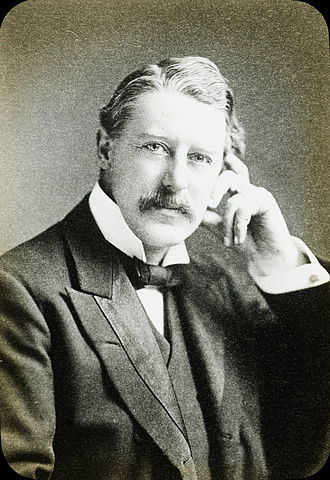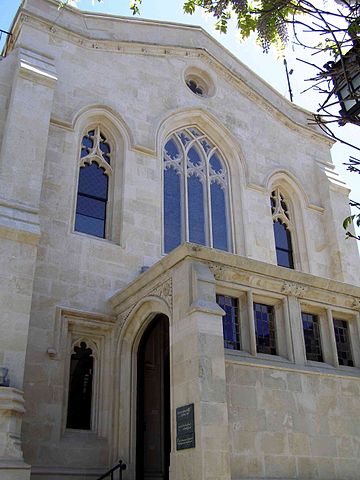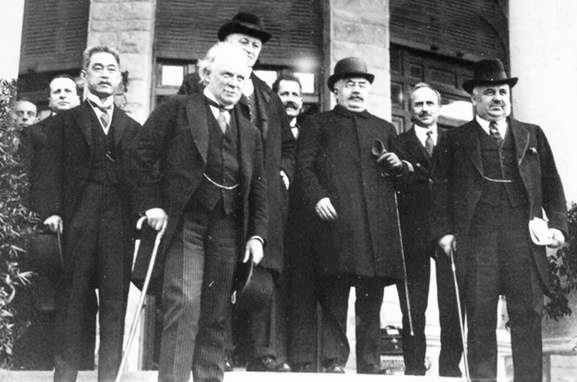Tracing the hand of God in the re-gathering of the Jews to Eretz Israel.
On 31 October 2017 we celebrated the centenary of the writing of the Declaration by Foreign Secretary Arthur James Balfour “in regard to the establishment of a national home in Palestine for the Jewish people”, which started the process by which the State of Israel was created on 14 May 1948.
The Declaration was a letter of “sympathy with Jewish Zionist aspirations which has been submitted to and approved by the Cabinet” for “the establishment in Palestine of a national home for the Jewish people”. It was sent to the leader of the Jewish community in Britain, Lord Walter Rothschild, assuring him of the British Government's “best endeavours to facilitate the achievement of this objective”, and was published on 2 November 1917.
This seminal event, in conjunction with the epic Battle of Beersheba (also on 31 October), heralded the end of the 400-year Ottoman occupation of the Land of Israel.
God’s Mo’ed
In God's calendar this date was a mo'ed: a set or appointed time in his promise to gather his ancient, scattered people back to the Land that he promised by covenant to give them (Gen 13:15, 15:18). There are many mo'edim in the scriptures (e.g. Gal 4:4; Rev 9:15).
1917 was both a confirmation of God’s faithfulness to his covenant and a footprint of the promised return of Messiah Yeshua.
The aggressive response to the celebration of its centenary, with many insisting that Britain 'apologise' for the Balfour Declaration, indicates God's hand at work.
In God’s calendar, 31 October 1917 was a ‘mo’ed’: an appointed time in his promise to gather his ancient, scattered people back to the Land.
In the Tanakh, the biblical mandate for Jewish presence in and return to the Land of Israel is clear (e.g. Gen 13:15, 15:18; Psa 132:13-14; Jer 32:37-38; Hos 2:23; Rom 9:26). God clearly states that Eretz Israel, the Land of Israel, is his choice for himself and his people.
But the prophesied return could not have happened without many people and situations being aligned. The letter sent to Baron Rothschild was but the latest step in a series of unlikely events that only the God of Israel could have arranged.
Figures of Faith
Many people in history anticipated the return of the Jewish people to Israel, believing God's promise to re-gather them from exile among the nations. These included:
- William Tyndale (1494-1536), a skilled linguist who translated the Bible from the Hebrew and Greek texts, allowing people to read and understand God's future plan for Israel’s return in their own language. An English Bible was placed in every parish.
 Henry Grattan Guinness, c. 1910. See Photo Credits.John Owen (1616-83), Vice-Chancellor of Oxford University, who wrote that Jews “shall return to their own land; they shall enjoy it for a quiet and everlasting possession, their adversaries being destroyed; they shall also be filled with the light and knowledge of the will and worship of God…and perhaps, shall be entrusted with great empire and rule in the world.”1
Henry Grattan Guinness, c. 1910. See Photo Credits.John Owen (1616-83), Vice-Chancellor of Oxford University, who wrote that Jews “shall return to their own land; they shall enjoy it for a quiet and everlasting possession, their adversaries being destroyed; they shall also be filled with the light and knowledge of the will and worship of God…and perhaps, shall be entrusted with great empire and rule in the world.”1
- George Whitefield (1714-70) and John (1703-1791) and Charles Wesley (1707-88) established in all church denominations belief in God's promise to re-gather the Jewish people, and helped embed biblical authority in British society.
- Bishop Ryle (1816-1900), who taught that more than ten of the 16 prophets of the Tanakh expressly predicted a final gathering of the Jewish people in their own Land. He said “I ask you, then, to settle it firmly in your mind that when God says a thing shall be done - we ought to believe it”.2
- Henry Gratton Guinness (1835-1910), through studies of Daniel and of astronomy, considered that 1917 would be a very significant year for Israel, to do with their restoration. When General Edmund Allenby was depressed by lack of advance in ousting the Turks from what was called Palestine, a friend encouraged him with the words, “You may make all the mistakes in tactics or strategy, but nothing can prevent you from being in Jerusalem by the 31st December”,3 citing Guinness’s prediction as proof. A letter published in the Daily Mail in January 1917 reminded readers that Guinness had said that this year is “one of the most important, perhaps the most momentous, of these terminal years of crisis.”4
Add to these the names of earlier supporters of a return of Jews to their Land: Cromwell, Rutherford, Gill (born 17th Century), Rippon, Wilberforce, Simeon (18th Century), Shaftesbury, Booth, Spurgeon, Hechler, Herzl, Moody (19th Century), as well as Balfour, Allenby and Rothschild, and we can see how God prepared the ground for the restoration of his people.
The prophesied return could not have happened without many people and situations being aligned.
19th Century: Preparing the Ground
In 1809, the London Society for Promoting Christianity among the Jews (now CMJ, the Church's Ministry among Jewish People) was founded. Its purpose was to declare the Messiahship of Yeshua, first for the Jew and then for the Gentile (Rom 1:16), to teach the Church about its Jewish roots and to encourage the physical restoration of the Jewish people to the Land of Israel. This work made the Jews jealous, and helped develop infrastructure such as schools and hospitals for their future return.
 Christchurch, Jerusalem. See Photo Credits.In 1839-41 the British Consulate in Jerusalem, as a reward for helping the Turks repel Egyptian advances, was given orders for the first time to protect the interests of Jews, and in February 1840 permitted to build both a guesthouse and a chapel in the Old City (Christchurch).
Christchurch, Jerusalem. See Photo Credits.In 1839-41 the British Consulate in Jerusalem, as a reward for helping the Turks repel Egyptian advances, was given orders for the first time to protect the interests of Jews, and in February 1840 permitted to build both a guesthouse and a chapel in the Old City (Christchurch).
In 1841 the first Bishop of Jerusalem, Michael Solomon Alexander, was appointed. And in 1849, George Gowler (Governor of Australia) returned to Britain and accompanied Sir Moses Montefiore to Israel to encourage investment in settlements for the returning Jewish people – all part of God's arrangements for the next century.
We must also remember the amazing and timely work of Eliezer Ben-Yehuda, the Lithuanian who went to Israel in 1881 and almost single-handedly restored the Hebrew language, following a vision of open heaven and a voice saying, “The renaissance of Israel on its ancestral soil”.5 His life’s work produced a working language that has helped to fulfil his vision to hold the Jewish people together and “conduct the business of life”.6 30,000 followed his hearse when he died in 1922.
Britain's unbelief in God's work and timing was shown by the comment in the 1911 Encyclopaedia Britannia that “The dream of some Zionists, that Hebrew - a would-be Hebrew, that is to say - will again become a living, popular language in Palestine, has still less prospect of realization than their vision of a restored Jewish empire in the Holy Land”.7 How dull of hearing can our nation be!
Zionism and Chaim Weizmann
But there is more! The rise in Jewish Zionism in Europe; the pogroms and persecution in Russia in the 1880s; the publication of Der Judenstadt in 1896 by Theodore Herzl following the framed Dreyfus trial in Paris; Herzl's encouragement by William Hechler, an Anglican minister who was convinced of Jewish restoration to Israel; these and more led to Herzl's prophecy of a Jewish state within 50 years following the First Zionist Congress in Basel in 1897.
World War I, when God began a shaking of the nations that continues today, also produced situations that God used for his purpose and timing. The British Foreign Secretary Sir Edward Grey remarked on the eve of WWI that "The lamps are going out all over Europe, we shall not see them lit again in our life-time". The political and social changes in Europe at that time altered situations irrevocably for whole nations, as well as for individuals.
World War I, when God began a shaking of the nations that continues today, also produced situations that God used for his purpose and timing.
One such individual was a chemist from Eastern Europe named Chaim Weizmann, who first met Arthur Balfour in 1905 while working in Manchester on the production of acetone for cordite needed for ammunition. He was an avid Zionist, and on 31 October 1917 (note the date) became President of the British Zionist Federation, working with Balfour to pen the Declaration.
God gave Weizmann favour with both the British and the American governments through 1915-1917 and he lobbied successfully to promote Jewish immigration to Israel in the face of British Mandate resistance. He became the first President of the new State of Israel.
Perfect Conditions
Despite all these historic arrangements, only in 1917 were conditions right for Balfour's declaration of intent and the British Government's agreement to act for its fulfilment.
Conditions were not right in 1916, because the PM (Asquith) was not a Zionist, or in 1918, when the War Cabinet had been disbanded and the (post-war) atmosphere was totally different. The miracle of the Balfour Declaration in 1917 was a mo'ed.
The British War Cabinet that God assembled in December 1916 at the collapse of the Asquith administration was interesting and unusual, being very cosmopolitan and composed mostly of Christians who supported a Jewish restoration to Israel. Each member, whether British or not, had a background and career that predisposed him to favour Balfour’s declaration, as Charles Gardner has outlined in this article.
Only the Lord could have arranged such a diverse group together for this mo'ed, at such a crucially important time.
From Intention to International Law
The Balfour Declaration in 1917 was a statement of intent only. But it was clearly central to God's purposes, and was later ratified in international law.
 San Remo Conference delegates, 1920. See Photo Credits.After WWI, the break-up of the Ottoman Empire led to the formation of mandates in the Middle East: areas not yet ready for sovereignty but given to Britain and France to prepare for independent statehood. The League of Nations agreed unanimously to this at the San Remo Conference in Italy in 1920.8
San Remo Conference delegates, 1920. See Photo Credits.After WWI, the break-up of the Ottoman Empire led to the formation of mandates in the Middle East: areas not yet ready for sovereignty but given to Britain and France to prepare for independent statehood. The League of Nations agreed unanimously to this at the San Remo Conference in Italy in 1920.8
France was given the Mandate for Lebanon, Syria, and Mesopotamia (Iraq) and Britain was given an extended Mandate for what was still called 'Palestine', which was not ready for statehood (many Jewish people had not yet returned, owing to Britain restricting immigration,9 and there was already Arab resistance).
Several other important outcomes of the San Remo Conference were:
- 'Palestine' was now a legal entity. All previous agreements (e.g. the Sykes-Pikot Plan) were ended.
- The Balfour Declaration was recognised and incorporated into international law.
- Sovereignty over 'Palestine' was invested in the Jewish people. They became the beneficiary because of their historical connection to the Land of Israel.
The legality of the State of Israel thus stems from the 1920 San Remo Agreement (which is still valid international law), NOT the UN Partition vote on 29 November 1947.10,11 But without the Balfour Declaration, the San Remo Conference would not have taken place.
Despite all these historic arrangements, only in 1917 were conditions right for Balfour's declaration of intent and the British Government's agreement to act for its fulfilment.
Onwards to Fulfilment
The journey from the San Remo Conference in 1920 to the re-creation of the State of Israel in 1948 is the subject of another article, but suffice to say that it was a spiritual battle every step of the way, as anti-Jewish forces (including within British politics and the military) sought to prevent the return of the Jewish people to their Land and to destroy the nascent state, both before and immediately after its creation.
All this time, God continued his preparation for the fulfilment of his mo'ed, for the re-gathering of his covenant people to Eretz Israel. Through the people and events of the day, even including those who resisted his purposes, we can see the orchestration of everything to serve his will and fulfil his word.
The birth of Israel in May 1948 was truly a miracle from the hand of the God of Israel, and in perfect accord with his timing.
- Isaiah 66:8: “Who has ever heard of such a thing? Who has ever seen such things? Can a country be born in a day, or a nation be brought forth in a moment?” We know the answer to these questions: it is Yes! For God answers his own questions and keeps his promises.
- Isaiah 55:10: “As the rain and the snow come down from heaven and do not return to it without watering the earth, and making it bud and flourish…so is My word that goes out from My mouth: It will not return to me empty, but will accomplish what I desire, and achieve the purpose for which I sent it.”
Amen and amen! Our response should continue to be as David’s was in 1 Chronicles 17:23: 'Lord, do as you have said.'
References
1 An Exposition of the Epistle to the Hebrews, Second Edition, Volume 1, published in Edinburgh in 1812, pp443-455.
2 Are You Ready for the End of Time? Available online.
3 Guinness, M, 2005. The Genius of Guinness. Ambassador.
4 Ibid.
5 E.g. see here and here.
6 St. John, R, 1952. The Life Story of Ben-Yehuda: Tongue of the Prophets. Balfour Books, 2013.
7 Encyclopedia Britannica, 1911, Semitic Languages.
8 This was also confirmed by the Allied Supreme Council in April 1921 and accepted wholesale when the UN was formed in 1945.
9 The British military administration became more pro-Arab and anti-Jewish between 1920 and 1948, reneging on their Mandate responsibilities by severely limiting Jewish immigration during this time.
10 The legal right of Jewish people to the Land of Israel was further confirmed and ratified by the League of Nations in July 1922.
11 This proposed that part of the Land (west of the River Jordan) should be for the Jewish people, and part (east of the River Jordan – the area we now call Jordan, which in 1920 was part of 'Palestine') should be for the Arabs, although the Arabs immediately rejected this plan. No Jews were permitted to settle east of the river Jordan, though Arabs were allowed to settle west of it.





